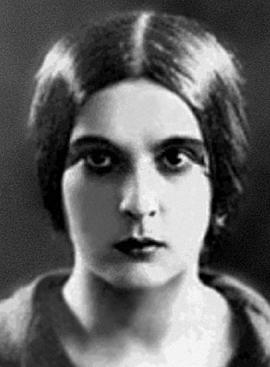Yuliya Solntseva facts for kids
Quick facts for kids
Yuliya Solntseva
|
|
|---|---|
 |
|
| Born |
Yuliya Ippolitovna Peresvetova
7 August 1901 |
| Died | 28 October 1989 (aged 88) |
| Occupation | Film director Actress |
| Years active | 1924–1979 |
| Spouse(s) | Aleksandr Dovzhenko |
Yuliya Ippolitovna Solntseva (Russian: Ю́лия Ипполи́товна Со́лнцева; born Yuliya Ippolitovna Peresvetova, 7 August 1901 – 28 October 1989) was a Soviet actress and film director. As an actress, she is known for starring in the silent sci-fi classic Aelita (1924). She is the first female winner of the Best Director Award at Cannes film festival in the 20th century and the first woman to win a directing prize at any of the major European film festivals, for the film Chronicle of Flaming Years, a war drama about Soviet resistance to Nazi occupation in 1941.
Biography
She was born on July 25 (or August 7) 1901 in Moscow in the family of Ippolit Peresvetov and Valentina Timokhina. Her mother worked as a senior cashier at the Muir and Maryliz Trading House (now TsUM). Yuliya and her brother were left without parents early in the care of their grandfather and grandmother.
After moving to St. Petersburg, where her grandfather was transferred, she studied at the gymnasium. Here she became interested in theater, played in an amateur studio.
She studied at the Faculty of History and Philology of Moscow University, but left her studies and entered acting courses at the State Institute of Musical Drama (now GITIS)..
After graduating from the institute in 1922, she received an invitation to the Moscow Kamerny Theatre under the direction of Alexander Tairov, where her career began, but soon left the theater to work in cinema. In 1924, she played the title roles in two films: she played Aelita the Queen of Mars in the film of the same name by Yakov Protazanov and Zina Vesenina in the comedy The Cigarette Girl from Mosselprom by Yuri Zhelyabuzhsky. “In Yakov Protazanov’s Aelita, Solntsev’s debutante from the troupe of the Tairov Kamerny Theater smashed the futuristic geometry of Mars with uneven breathing towards a stray engineer from Earth”.
Since 1929, she worked as an assistant director at the studios of All-Ukrainian Photo Cinema Administration, the Moscow film factory Soyuzkino (later Mosfilm) and the Kyiv film factory (later the Kyiv film studio). Since 1939, she staged films as a director: at first, together with her husband Alexander Dovzhenko, after his death, on her own. Some of the films were based on unrealized screenplays of her husband.
In July 1941, the spouses were evacuated to Ufa, then to Ashgabat, where all the largest film studios, united in the Central Newsreel Studio, were brought. Solntseva acted as one of the directors of a documentary trilogy about the battle on the southern fronts. Since 1946 she worked at Mosfilm.
Solntseva directed 14 films between 1939 and 1979. She collaborated with husband Aleksandr Dovzhenko on his later films, including Michurin (1949), for which she was awarded a Stalin Prize.
For The Chronicle of Flaming Years she won the Best Director award at the 1961 Cannes Film Festival. She was also a jury member at the 1975 Cannes Film Festival. She was named a People's Artist of the USSR when she turned 80.
Yuliya Ippolitovna Solntseva died on October 29, 1989 in Moscow. She was buried at the Novodevichy Cemetery (plot No. 3) next to her husband.
Personal life
- Husband - Alexander Dovzhenko (1894-1956), film director. They met in 1928 in Odessa and got officially married a year later.
Honours and awards
- Stalin Prize, 2nd class (1949) - for the film Michurin (1948)
- All-Union Film Festival (1959) - A special honorary diploma film "Poem of the Sea"
- Cannes International Film Festival (1961) - Award for Best Director for the film "Chronicle of Flaming Years"
- International Film Festival in London (1962) - Honorary diploma for the film "Poem of the Sea"
- San Sebastián International Film Festival (1965) - Special Diploma of the Jury "for the artistic and technical merits" of the film "Enchanted Desna"
- People's Artist of the RSFSR (1964)
- People's Artist of the USSR (1981)
- Order of Lenin
Literature
See also
 In Spanish: Yuliya Solntseva para niños
In Spanish: Yuliya Solntseva para niños

